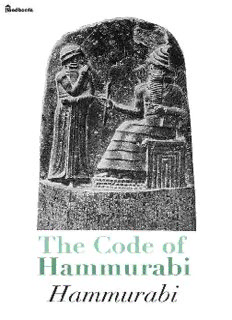
The Code of Hammurabi PDF
Preview The Code of Hammurabi
The Code of Hammurabi Hammurabi (Translator: Rev. Claude Hermann Walter Johns) Published: -1790 Categorie(s): Non-Fiction, History, Social science, Political science Source: http://oll.libertyfund.org/index.php? option=com_content&task=view&id=1472&Itemid=264 About Hammurabi: Hammurabi (Akkadian from Amorite ˤAmmurāpi, "the kinsman is a healer," from ˤAmmu, "paternal kinsman," and Rāpi, "healer"; (ca. 1728 – 1686 BC middle chronology) was the sixth king of Babylon. He became the first king of the Babylonian Empire, extending Babylon's control over Mesopotamia by winning a series of wars against neighboring kingdoms. Although his empire controlled all of Mesopotamia at the time of his death, his successors were unable to maintain his empire. Owing to his reputation in modern times as an ancient law-giver, Hammurabi's portrait is in many government buildings throughout the world. Note: This book is brought to you by Feedbooks http://www.feedbooks.com Strictly for personal use, do not use this file for commercial purposes. THE CODE OF HAMMURABI Witchcraft and the ordeal by water § 1. If a man has accused another of laying a nêrtu (death spell?) upon him, but has not proved it, he shall be put to death. Witchcraft and the ordeal by water § 2. If a man has accused another of laying a kišpu (spell) upon him, but has not proved it, the accused shall go to the sacred river, he shall plunge into the sacred river, and if the sacred river shall conquer him, he that accused him shall take possession of his house. If the sacred river shall show his innocence and he is saved, his accuser shall be put to death. He that plunged into the sacred river shall appropriate the house of him that accused him. False witness in capital suit § 3. If a man has borne false witness in a trial, or has not established the statement that he has made, if that case be a capital trial, that man shall be put to death. False witness in In civil case § 4. If he has borne false witness in a civil law case, he shall pay the damages in that suit. Judgment once given not to be altered § 5. If a judge has given a verdict, rendered a decision, granted a written judgment, and afterward has altered his judgment, that judge shall be prosecuted for altering the judgment he gave and shall pay twelvefold the penalty laid down in that judgment. Further, he shall be publicly expelled from his judgment- seat and shall not return nor take his seat with the judges at a trial. Burglary and acceptance of stolen goods § 6. If a man has stolen goods from a temple, or house, he shall be put to death; and he that has received the stolen property from him shall be put to death.
Description: